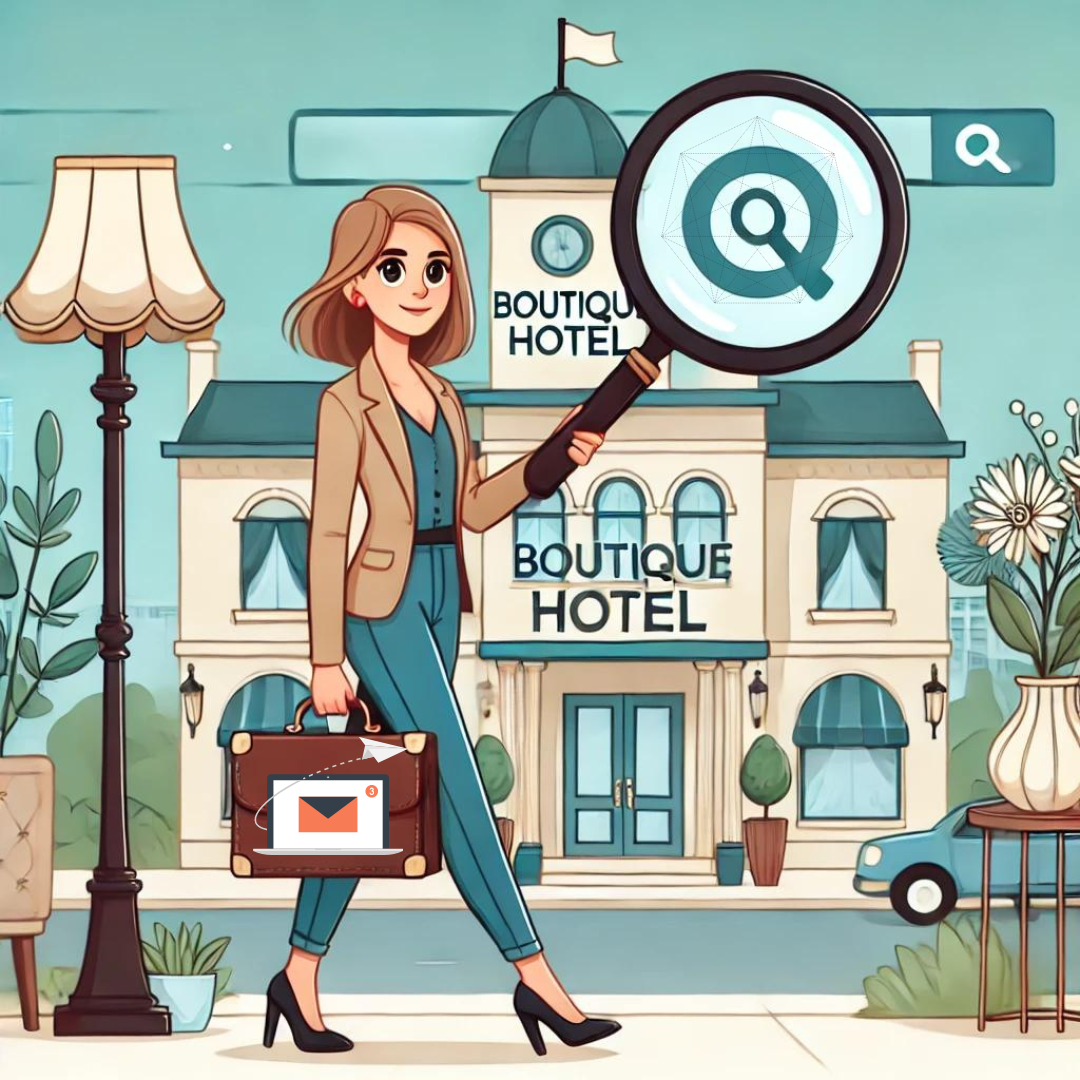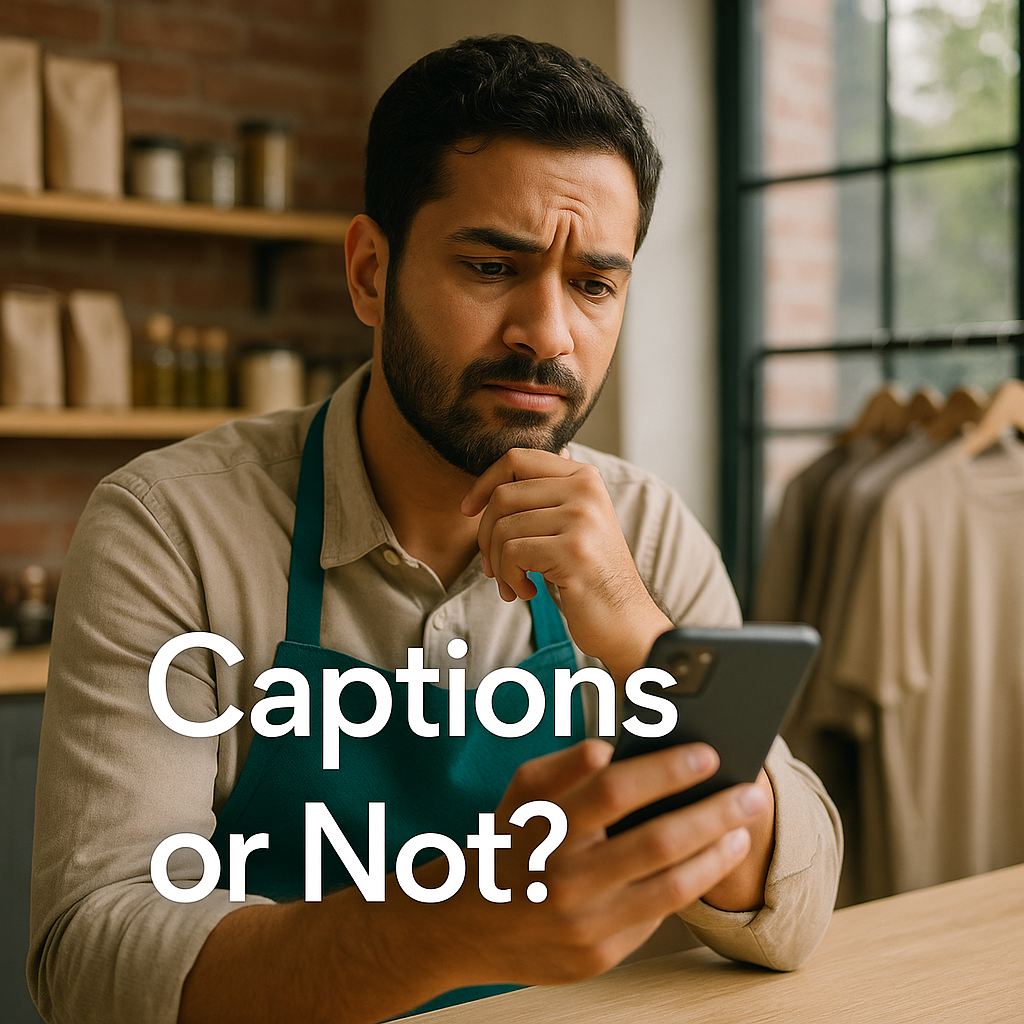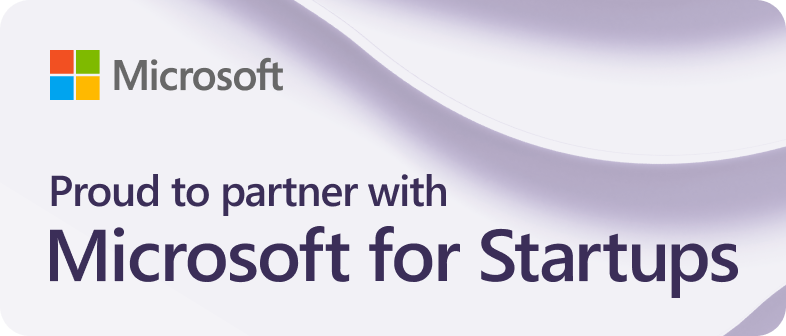You’ve just launched your boutique hotel, and everything is perfect—the rooms are meticulously decorated, the kitchen is stocked with gourmet delights, and the staff is ready to offer impeccable service.
Yet, as you walk through the empty hallways and glance at the untouched guest book, a sinking feeling sets in: where are the guests?
Despite all your efforts, the rooms remain vacant, and the bustling atmosphere you envisioned is nowhere to be seen.
This stark reality can be incredibly disheartening, but you’re not alone in this struggle.
Many boutique hotel owners face the same challenge, and the solution lies in mastering a robust digital marketing strategy that will attract guests and turn your hotel into a thriving destination.
Mastering the Basics of Digital Marketing Strategy
Digital marketing isn’t just a buzzword; it’s a vital tool for attracting guests and filling your rooms.
For boutique hotel owners, understanding and leveraging digital marketing can mean the difference between an empty hotel and a fully booked one.
Digital marketing encompasses a range of strategies designed to reach potential guests online. This includes optimizing your website, utilizing social media, email marketing, and online ads. Additionally, strategies like referral and affiliate marketing, influencer marketing, simple public relations, and partnerships with bloggers can significantly boost your hotel’s visibility and credibility.
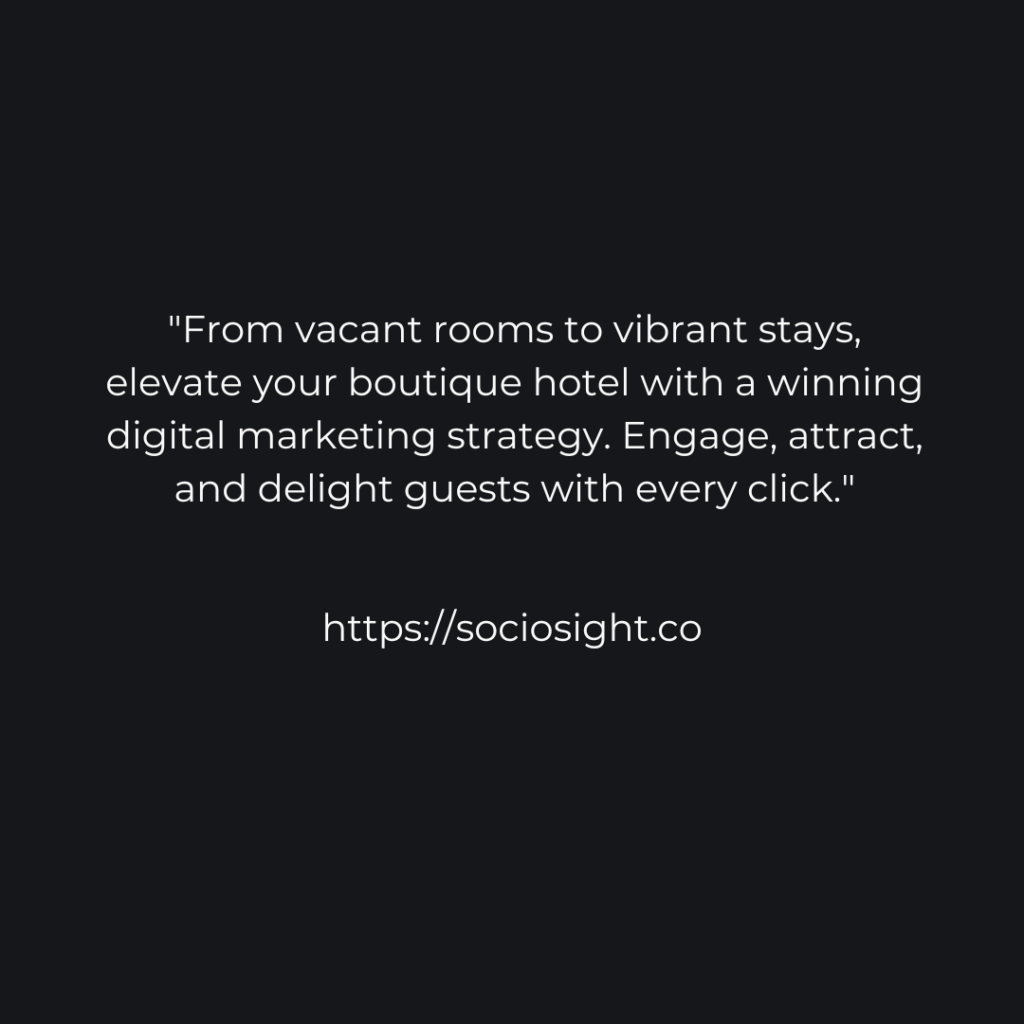
Choosing the right channels and strategies depends on your specific marketing goals.
Whether you’re aiming for brand awareness, encouraging interaction, generating leads, securing bookings, encouraging repeat bookings, or turning loyal customers into ambassadors, it’s essential to tailor your approach to meet these objectives.
Do you struggle with managing multiple social media platforms for your brand's presence?
The Sociosight app can help you simplify the process and save you time. With Sociosight, you can publish, schedule, and monitor posts and engage with your followers across multiple social media platforms, all from one dashboard.
Get started today with a free sign-up!
Register Now for Free

In the following steps, we will break down these strategies into actionable steps you can implement immediately to start seeing results.
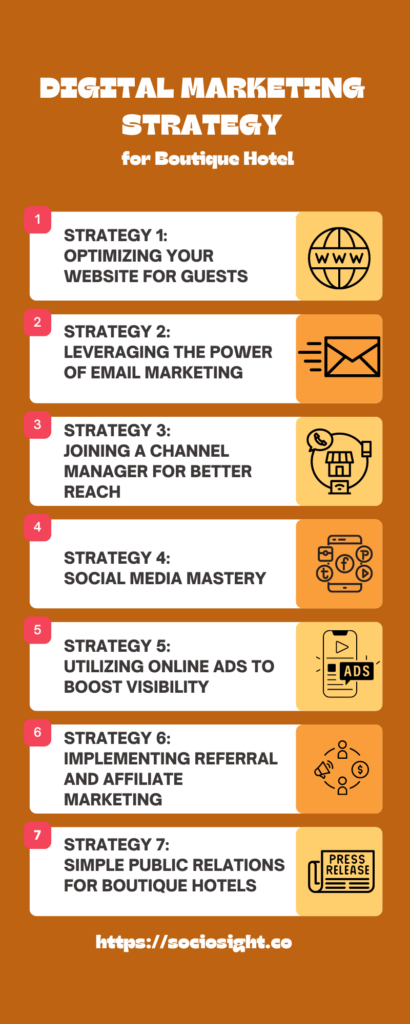
Table of Contents
Strategy 1: Optimizing Your Website for Guests
Your website is often the first point of contact potential guests have with your hotel. It needs to make a strong first impression and be optimized for both search engines and user experience.
Here’s how you can achieve that:
Enhance User Experience (UX):
- Easy Navigation: Ensure your website is easy to navigate with clear menus and well-organized content. Guests should be able to find information quickly and effortlessly.
- High-Quality Visuals: Use high-quality images and videos to showcase your rooms, amenities, and local attractions. This not only grabs attention but also builds trust and interest.
- Intuitive Booking Process: Implement a straightforward booking process with a visible and accessible booking button on every page. The fewer clicks it takes to book, the better.
Improve Website Speed:
- Fast Loading Times: Optimize your website to load quickly. Slow websites can frustrate potential guests and lead to higher bounce rates. Use tools like Google PageSpeed Insights to identify areas for improvement.
- Mobile Responsiveness: Ensure your website is fully responsive and provides a seamless experience on all devices, especially smartphones. More and more guests are booking rooms on their mobile devices.
SEO Optimization:
- Keyword Research: Identify and use relevant keywords that potential guests might use to find hotels in your area. Incorporate these keywords naturally into your website content, meta descriptions, and titles.
- On-Page SEO: Optimize your website’s on-page elements such as headers, image alt texts, and internal linking. This helps search engines understand and rank your site better.
- Local SEO: Focus on local SEO strategies to appear in local search results. Claim your Google My Business listing and ensure your NAP (Name, Address, Phone number) information is consistent across all online platforms.
- Off-Page SEO: Partnering with Bloggers: Collaborate with relevant bloggers to create guest posts and backlinks that improve your SEO. This not only boosts your search engine rankings, but also drives traffic from trusted sources. Building long-term relationships with bloggers can provide continuous promotion and enhance your digital marketing strategy.
Compelling Content:
- Engaging Descriptions: Write compelling and detailed descriptions of your rooms, services, and amenities. Highlight unique features and benefits that set your hotel apart from competitors.
- Local Attractions: Provide information about local attractions, events, and activities. This not only adds value, but also improves your SEO by including local keywords.
- Guest Testimonials: Feature guest testimonials and reviews prominently on your website. Positive reviews build credibility and encourage potential guests to book.
- Travel Tips and Hospitality Content: Share travel tips, guides, and other content related to the hospitality industry. This positions your website as a valuable resource for travelers, increasing engagement and the likelihood of bookings.
- Behind-the-Scenes Content: Showcase behind-the-scenes content to give guests a glimpse of the day-to-day operations, staff preparations, and the personality of your hotel.
- Team and Management Information: Introduce your team and management to build a personal connection with potential guests. Highlight their expertise, hospitality philosophy, and commitment to guest satisfaction.
Security and Trust:
- Secure Booking: Ensure your booking process is secure with SSL certificates and visible trust badges. Guests need to feel confident that their personal information is safe.
- Transparency: Be transparent about pricing, policies, and additional fees. Clear and honest communication builds trust and reduces the likelihood of booking abandonment.
Optimizing your website for both user experience and search engines may help to attract more visitors, keep them engaged, and ultimately convert them into paying guests. This foundational step is crucial for the success of your digital marketing strategy.
A well-optimized website serves as the cornerstone of your digital marketing strategy, ensuring that all your other marketing efforts are supported by a strong online presence.
Strategy 2: Leveraging the Power of Email Marketing
Email marketing is a powerful tool in your digital marketing strategy for engaging with potential guests, nurturing leads, and encouraging repeat bookings.
Here’s how you can effectively leverage email marketing for your boutique hotel:
Building and Segmenting Your Email List:
- Website Visitors: Use sign-up forms and pop-ups on your website to capture email addresses from visitors. Offer incentives such as exclusive discounts, free guides, or updates about local events to encourage sign-ups.
- Social Media Visitors: Promote your email sign-up form on your social media profiles and posts. Use call-to-action buttons on platforms like Facebook and Instagram to direct followers to your sign-up page.
- Former Guests: Collect email addresses from guests who have previously stayed at your hotel. Ask for their consent to receive marketing emails during check-in or check-out, and offer loyalty discounts or special offers for their next stay.
Crafting Compelling Email Campaigns:
- Personalized Content: Personalize your emails with the recipient’s name and tailor the content based on their preferences and booking history. Personalized emails have higher open and click-through rates.
- Engaging Subject Lines: Write attention-grabbing subject lines that encourage recipients to open your emails. Keep them short, intriguing, and relevant to the content inside.
- High-Quality Content: Create visually appealing and informative emails that provide value to your subscribers. Include information about special offers, upcoming events, travel tips, and updates about your hotel.
Automated Email Sequences:
- Welcome Series: Set up an automated welcome series for new subscribers. Introduce your hotel, share unique selling points, and offer a special discount for their first booking.
- Nurturing Leads: Create a sequence of emails that nurture potential guests over time. Provide valuable content, such as travel guides or local attraction highlights, to keep them engaged and interested in your hotel.
- Encouraging Repeat Bookings: Send automated follow-up emails to former guests, thanking them for their stay and offering exclusive discounts for their next visit. Highlight new amenities, upcoming events, or special promotions.
Segmenting Your Audience:
- Demographic Segmentation: Segment your email list based on demographics such as age, location, and travel preferences. Tailor your email content to match the interests and needs of each segment.
- Behavioral Segmentation: Segment your audience based on their behavior, such as past booking history, website interactions, and email engagement. Send targeted emails that are relevant to their specific actions and interests.
Analyzing and Optimizing Performance:
- Track Key Metrics: Monitor key email marketing metrics such as open rates, click-through rates, conversion rates, and unsubscribe rates. Use these insights to understand what works and what doesn’t.
- A/B Testing: Conduct A/B tests on different elements of your emails, such as subject lines, content, and call-to-action buttons. Use the results to optimize your campaigns for better performance.
- Continuous Improvement: Regularly review and refine your email marketing strategy based on performance data and feedback. Stay updated with email marketing best practices and trends to keep your campaigns effective.
Leveraging the power of email marketing will enable you to build strong relationships with potential and former guests, keep them engaged with your hotel, and encourage them to book their next stay with you. This step is a crucial component of your overall digital marketing strategy, driving both new and repeat bookings for your boutique hotel.
Strategy 3: Joining a Channel Manager for Better Reach
A channel manager is an essential tool for boutique hotels looking to maximize their online presence and streamline booking management.
By integrating your hotel with a channel manager, you can reach a broader audience, manage multiple booking channels, and keep your availability and rates up to date in real-time.
Here’s how to effectively utilize a channel manager:
Understanding Channel Managers:
- Definition: A channel manager is a software tool that connects your hotel’s property management system (PMS) with various online travel agencies (OTAs) and booking platforms. It allows you to manage your hotel’s availability, rates, and bookings from a single dashboard.
- Importance: With a channel manager, you can avoid overbookings, reduce manual updates, and ensure that your hotel is listed on multiple booking platforms simultaneously, increasing your visibility and potential bookings.
Steps to Integrate with a Channel Manager:
- Choose the Right Channel Manager: Research and select a channel manager that integrates well with your existing PMS and supports the OTAs and booking platforms most relevant to your target audience. Consider factors such as ease of use, customer support, and pricing.
- Set Up Your Account: Follow the channel manager’s setup process to create your account and connect it to your PMS. This may involve importing your hotel’s inventory, rates, and booking policies.
- Connect to OTAs and Booking Platforms: Link your channel manager to the OTAs and booking platforms where you want your hotel to be listed. This typically involves authorizing the connection and mapping your room types and rates.
Benefits of Using a Channel Manager:
- Real-Time Updates: Ensure that your hotel’s availability and rates are updated in real time across all connected platforms. This reduces the risk of overbookings and discrepancies.
- Wider Distribution: Increase your hotel’s visibility by listing it on multiple OTAs and booking platforms. This helps you reach a broader audience and attract more bookings.
- Time Savings: Save time and reduce the workload for your staff by automating the process of updating availability, rates, and reservations across multiple channels.
- Revenue Management: Use the channel manager’s reporting and analytics tools to monitor your hotel’s performance across different platforms. Adjust your rates and availability based on demand to maximize revenue.
Maximizing the Effectiveness of Your Channel Manager:
- Regular Monitoring: Regularly monitor your channel manager dashboard to ensure that all connections are functioning correctly and that your availability and rates are accurate.
- Promotions and Package: Use the channel manager to create and distribute special promotions, packages, and discounts across multiple platforms. This can help attract more guests during off-peak periods.
- Guest Reviews: Keep an eye on guest reviews and feedback from different platforms. Address any issues promptly and use positive reviews to highlight your hotel’s strengths.
Joining a channel manager helps you to efficiently manage your hotel’s online presence, reach a wider audience, and increase your bookings. This step is a crucial part of your digital marketing strategy, ensuring that your hotel remains competitive and visible in the crowded online marketplace.
Strategy 4: Social Media Mastery
Social media is a powerful platform for engaging with potential guests, showcasing your hotel’s unique features, and building a loyal community.
Mastering social media involves creating engaging content, interacting with your audience, and using tools like Sociosight.Co to streamline your efforts.
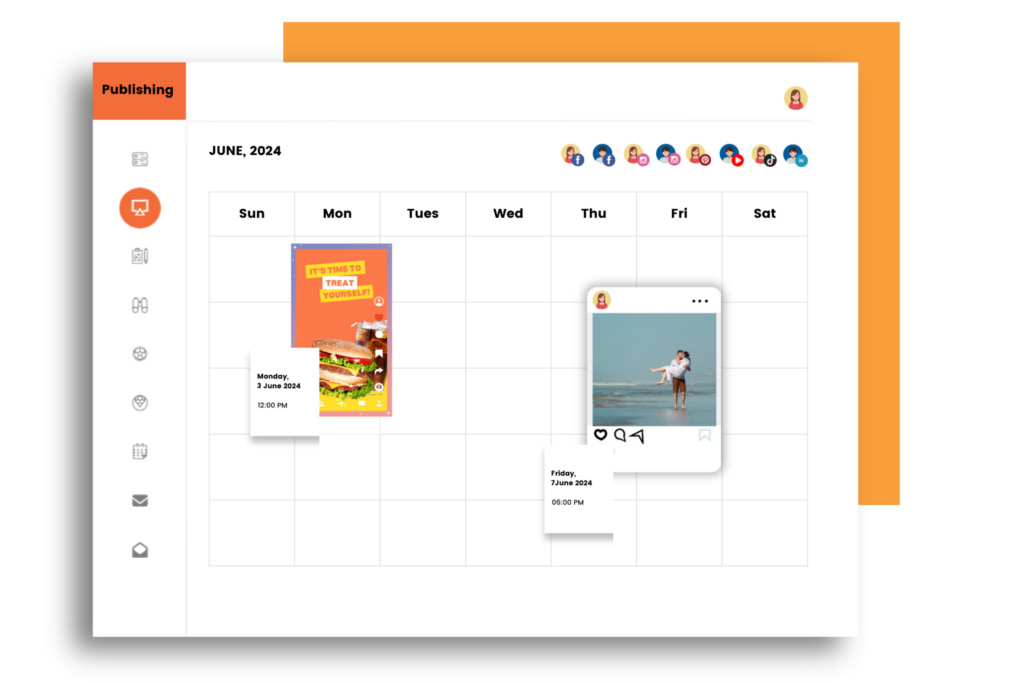
Here’s how you can effectively leverage social media for your boutique hotel:
Identifying the Right Platforms:
- Know Your Audience: Identify the social media platforms where your target audience is most active. For boutique hotels, Instagram, Facebook, TikTok, YouTube and Pinterest are often effective due to their visual nature.
- Platform-Specific Strategies: Tailor your content and approach to each platform. For example, use Instagram for high-quality photos and stories, Facebook for longer posts and events, YouTube for detailed video content, and TikTok for short, engaging clips.
Creating Engaging Content:
Step 1: Search or Research for Compelling Content Ideas
- Research Methods: Explore trending topics, hashtags, and competitor content to find inspiration. Utilize tools like Google Trends, BuzzSumo, and social media analytics.
- Content Types and Formats: Identify the type of content (educational, entertaining, inspirational, promotional) and format (video, image, multiple images) that best suits your audience and goals. This helps in crafting a comprehensive digital marketing strategy
- ChatGPT for Idea Generation: Use ChatGPT to generate fresh and innovative content ideas. ChatGPT Prompt Template for Idea Generation: “Generate content ideas for a boutique hotel with [Brand description] targeting [target audience]. The content should include educational, entertaining, inspirational, and promotional posts in various formats (video, image, multiple images). Provide a mix of ideas that highlight the hotel’s unique features, local attractions, traveling tips, and special offers.”
Step 2: Write the Content
- Copywriting Formulas: Use proven copywriting formulas like AIDA (Attention, Interest, Desire, Action) to craft your content. Incorporate storytelling, bold facts, and emotional triggers to engage your audience.
- ChatGPT for Content Writing: Utilize ChatGPT to assist in writing captivating social media posts. Use the following template to start: “Create detailed content for [Content Idea] for [Social Media Platform] using the copywriting formula of [AIDA/PAS/BAB/Etc]. The post should reflect our [Brand Description] and focus on [Specific Product/Service]. Include a catchy [Hook/Headline/Caption] and describe a matching visualization concept. Our objective for this post is to [Objective] maintain our brand’s [Brand Voice and Tone].
Publishing Your Content
- Social Media Management Tools: Use tools like Sociosight.Co to schedule posts across multiple platforms. This ensures consistent posting and saves time.
- Optimal Posting Times: Research and identify the best times to post on each platform to maximize engagement. Sociosight.Co can provide insights on the best times based on when your target audience is most active.
- Content Calendar: Create a content calendar to plan and organize your posts in advance. This helps in maintaining a consistent posting schedule and aligning your content with marketing campaigns and events.
- Cross-Posting: Adapt and share your content across different platforms using Sociosight.Co to reach a broader audience. Ensure the content is optimized for each platform’s format and audience preferences.
- Use Hashtags Strategically: Incorporate relevant and trending hashtags to increase the visibility of your posts. Create a branded hashtag for your hotel to encourage user-generated content and build a community around your brand.
- Engage with Trends: Participate in trending topics and challenges that align with your brand. This can help increase your content’s reach and relevance. Also, monitor updates released by each social media platform, for example: Instagram Update, to adjust your content strategy
Engaging with Your Audience
- Engagement Strategy:
- Respond promptly to comments, messages, and reviews.
- Interact with your audience by commenting on their posts and replying to their stories.
- Use Sociosight.Co’s engagement features to filter unanswered comments and categorize comments based on sentiment.
- Encourage User-Generated Content:
- Create special campaigns with specific hashtags that include your brand name.
- Encourage guests to share their experiences and tag your account.
Monitoring Your Content Performance
- Analytics Tools: Use social media analytics tools like Sociosight.Co to track engagement rates, conversion rates (profile views, website clicks, messages), and other key metrics.
- Recommendations: Sociosight.Co provides insights on the best times to post based on when your target audience is most active.
Incorporating Influencer Marketing Strategies
- Identify Influencers: Partner with local influencers or travel bloggers who align with your hotel’s brand. Influencers can help you reach a larger audience and add credibility to your hotel.
- Collaborative Campaigns: Work with influencers to create collaborative campaigns, such as hosting them for a stay and having them share their experiences with their followers.
- Measuring ROI: Track the impact of influencer collaborations through metrics such as increased followers, engagement, and bookings.
Pro Tips:
- YouTube: Create longer-form video content that provides an in-depth look at your hotel, virtual tours, guest testimonials, and local attractions.
- TikTok: Utilize TikTok for short, engaging videos that highlight unique aspects of your hotel, fun behind-the-scenes moments, and quick travel tips.
- Instagram: Use high-quality photos, stories, and Instagram Reel to showcase your hotel’s aesthetics and guest experiences.
- Facebook: Post longer updates, and events, and engage with followers through comments and messages.
Mastering social media allows you to create a vibrant online presence that attracts and engages potential guests. This step is essential to your digital marketing strategy, helping you build brand awareness, foster community, and drive bookings for your boutique hotel.
Strategy 5: Utilizing Online Ads to Boost Visibility
Online advertising is a powerful way to increase your hotel’s visibility, reach a targeted audience, and drive direct bookings.
By setting up and optimizing online ads, you can effectively attract potential guests to your boutique hotel.
Here’s how you can leverage online ads as part of your digital marketing strategy:
Basics of Setting Up Online Ads:
- Google Ads: Create search and display ads on Google to reach users who are actively searching for hotels or travel-related content. Use targeted keywords relevant to your hotel and location.
- Meta Ads (Facebook and Instagram): Set up ads on Facebook and Instagram to reach a broad audience through visually appealing content. Utilize Facebook’s robust targeting options to refine your audience based on demographics, interests, and behaviors.
Targeting the Right Audience:
- Demographic Targeting: Use demographic filters to target ads to specific age groups, genders, income levels, and more. Tailor your messaging to resonate with each segment.
- Interest-Based Targeting: Target users based on their interests, such as travel, luxury stays, or local attractions. This helps ensure your ads are shown to users who are more likely to be interested in your hotel.
- Behavioral Targeting: Reach users based on their online behaviors, such as previous searches for hotels or travel-related content. This allows you to target potential guests who are actively planning a trip.
Creating Effective Ad Content:
- Compelling Visuals: Use high-quality images and videos that highlight your hotel’s unique features, rooms, amenities, and local attractions. Visual content is crucial for capturing attention and driving engagement.
- Clear Call-to-Action (CTA): Include a clear and compelling CTA in your ads, such as “Book Now,” “Learn More,” or “Get Special Offer.” Make it easy for users to take the desired action.
- Highlighting Unique Selling Points: Emphasize what makes your hotel stand out, such as special packages, exclusive amenities, or local experiences. Showcase these unique features in your ad copy and visuals.
Measuring and Optimizing Ad Performance:
- Tracking Metrics: Monitor key performance metrics such as impressions, clicks, click-through rates (CTR), conversions, and return on ad spend (ROAS). Use tools like Google Analytics and Facebook Ads Manager to track these metrics.
- A/B Testing: Conduct A/B tests to compare different versions of your ads. Test variations in headlines, visuals, CTAs, and targeting options to determine what works best.
- Budget Optimization: Allocate your budget based on the performance of your ads. Invest more in high-performing campaigns and adjust or pause underperforming ones to maximize your ROI.
Retargeting Strategies:
- Website Visitors: Use retargeting ads to reach users who have previously visited your website but did not book. Show them personalized ads to remind them of your hotel and encourage them to complete their booking.
- Abandoned Bookings: Target users who started the booking process but did not complete it. Use retargeting ads to offer incentives, such as discounts or special offers, to encourage them to finalize their booking.
Utilizing online ads can significantly boost your hotel’s visibility and attract more potential guests. This step is a crucial component of your digital marketing strategy, helping you reach a targeted audience and drive direct bookings for your boutique hotel.
Strategy 6: Implementing Referral and Affiliate Marketing
Referral and affiliate marketing are powerful strategies to leverage your existing guests and partners to attract new bookings. These methods incentivize satisfied customers and affiliates to promote your hotel, expanding your reach and boosting credibility.
Here’s how to implement referral and affiliate marketing as part of your digital marketing strategy:
Encouraging Satisfied Guests to Refer Others:
- Create a Referral Program: Design a referral program that rewards guests for referring new customers. Offer incentives such as discounts on future stays, free amenities, or gift vouchers to enhance your digital marketing strategy.
- Promote the Program: Make your referral program visible on your website, social media platforms, and during check-out. Inform guests about the program via email and in-room promotional materials as part of your comprehensive digital marketing strategy.
- Ease of Participation: Ensure that participating in the referral program is easy. Provide clear instructions and simple steps for guests to refer their friends and family, integrating seamlessly into your digital marketing strategy.
Setting Up an Affiliate Program:
- Identify Potential Affiliates: Look for travel bloggers, local businesses, influencers, and online travel agencies that align with your hotel’s brand and target audience as part of your digital marketing strategy.
- Create an Affiliate Portal: Set up an online portal where affiliates can sign up, access promotional materials, track their referrals, and monitor their earnings, supporting your overall digital marketing strategy.
- Offer Attractive Commissions: Provide competitive commissions to motivate affiliates. Structure the commission based on bookings made through their referrals, ensuring it complements your digital marketing strategy.
Tracking and Rewarding Referrals:
- Unique Referral Codes: Assign unique referral codes or tracking links to each guest and affiliate. This helps in accurately tracking the source of each booking, making it a critical component of your digital marketing strategy.
- Monitor Performance: Use referral and affiliate marketing software to track referrals, bookings, and conversions. Monitor the performance of your referral and affiliate programs to identify top performers and areas for improvement within your digital marketing strategy.
- Reward Promptly: Ensure that rewards and commissions are distributed promptly. Timely rewards encourage continued participation and positive word-of-mouth, enhancing your digital marketing strategy.
Promoting Your Referral and Affiliate Programs:
- Email Marketing: Use email campaigns to inform your previous guests about your referral program. Highlight the benefits and easy participation steps as part of your digital marketing strategy.
- Social Media: Promote your referral and affiliate programs on your social media channels. Use engaging visuals and compelling copy to attract attention, integrating these efforts into your digital marketing strategy.
- Website Promotion: Dedicate a section of your website to your referral and affiliate programs. Include detailed information, sign-up forms, and testimonials from successful participants to support your digital marketing strategy.
Leveraging User-Generated Content:
- Encourage Reviews and Testimonials: Ask satisfied guests to leave reviews on your website and popular travel review sites. Positive reviews act as referrals and attract new guests, bolstering your digital marketing strategy.
- Feature Success Stories: Share stories of successful referrals and affiliate partnerships on your blog and social media. Highlight the rewards earned and the positive experiences of both guests and affiliates, enriching your digital marketing strategy.
Implementing referral and affiliate marketing may enable you to tap into the networks of your satisfied guests and partners to attract new bookings. This step is a valuable addition to your digital marketing strategy, helping you build a loyal customer base and enhance your hotel’s reputation.
Strategy 7: Simple Public Relations for Boutique Hotels
Public relations (PR) is an essential component of a successful digital marketing strategy.
By creating and maintaining a positive public image, you can enhance your hotel’s reputation, attract media attention, and build strong relationships with your community and guests.
Here’s how to implement effective PR as part of your digital marketing strategy:
Creating and Distributing Press Releases:
- Write Compelling Press Releases: Craft press releases that highlight newsworthy events, such as grand openings, special promotions, or community involvement. Ensure that your press releases are well-written and include essential details to support your digital marketing strategy.
- Distribute to Relevant Media Outlets: Identify and reach out to local and industry-specific media outlets, including newspapers, magazines, blogs, and online platforms. Distributing press releases to the right channels is crucial for your digital marketing strategy.
- Follow Up: After sending out press releases, follow up with journalists and editors to encourage coverage. Building relationships with media professionals can enhance your PR efforts and your overall digital marketing strategy.
Building Relationships with Local Media:
- Engage with Journalists: Regularly engage with local journalists and media professionals by inviting them to your hotel events, offering exclusive tours, or hosting media nights. These efforts can strengthen your digital marketing strategy.
- Provide Story Ideas: Offer story ideas that align with current trends or community interests. Pitching unique angles can help secure media coverage and boost your digital marketing strategy.
- Be Available: Make yourself available for interviews and comments on relevant industry topics. Being a go-to source for media can enhance your hotel’s visibility and support your digital marketing strategy.
Leveraging Community Involvement:
- Participate in Local Events: Get involved in local events and community activities. Sponsoring or hosting events can increase your hotel’s visibility and foster goodwill as part of your digital marketing strategy.
- Support Local Causes: Align your hotel with local charities or causes. Promoting your involvement in community initiatives can enhance your reputation and integrate well into your digital marketing strategy.
- Share on Social Media: Use social media to share your community involvement. Highlighting your participation in local events and causes can engage your audience and reinforce your digital marketing strategy.
Collaborating with Travel Bloggers and Influencers:
- Identify Relevant Bloggers and Influencers: Look for travel bloggers and influencers who align with your hotel’s brand and target audience. Collaborations with these individuals can amplify your digital marketing strategy.
- Offer Compelling Collaborations: Provide unique experiences or exclusive offers for bloggers and influencers to share with their followers. These collaborations can drive traffic and bookings, enhancing your digital marketing strategy.
- Monitor and Measure: Track the performance of your collaborations to assess their impact on your bookings and brand visibility. Measuring success helps refine your PR efforts and supports your digital marketing strategy.
Utilizing Online PR Platforms:
- Use Online PR Services: Platforms like PRWeb, PR Newswire, and Help a Reporter Out (HARO) can help distribute your press releases and connect you with journalists looking for story ideas. These platforms can be integral to your digital marketing strategy.
- Optimize for SEO: Ensure that your online press releases and articles are optimized for search engines. Using relevant keywords can increase visibility and support your digital marketing strategy.
- Monitor Online Mentions: Use tools like Google Alerts and Mention to monitor online mentions of your hotel. Responding to online coverage can enhance your hotel’s reputation and integrate well into your digital marketing strategy.
Implementing simple public relations strategies can effectively enhance your hotel’s reputation and visibility. This step is a crucial part of your digital marketing strategy, helping you build strong relationships with the media, community, and your guests.
Conclusion: Turning Your Digital Strategy into Guest Bookings
Implementing a comprehensive digital marketing strategy is crucial for attracting guests and ensuring the success of your boutique hotel. By following the steps outlined in this guide, you can create a robust online presence, engage with potential guests, and drive bookings.
Here’s how to turn your digital marketing strategy into tangible results:
Recap of Key Marketing Strategies:
- Optimizing Your Website: Ensure your website is user-friendly, SEO-optimized, and showcases your hotel’s unique features. A well-optimized website serves as the foundation of your digital marketing strategy.
- Partnering with Bloggers for Off-Page SEO: Collaborate with bloggers to improve your SEO through guest posts and backlinks. This enhances your online visibility and complements your overall marketing strategies.
- Leveraging Email Marketing: Build and segment your email list, create compelling email campaigns, and use automated sequences to nurture leads and encourage repeat bookings. Email marketing is a powerful tool in your digital marketing strategy.
- Joining a Channel Manager: Use a channel manager to manage your hotel’s availability and rates across multiple booking platforms. This ensures broader reach and is a critical component of your digital marketing strategy.
- Mastering Social Media: Identify the right platforms, create engaging content, and use tools like Sociosight.Co to streamline your efforts. Social media mastery is essential for building brand awareness and driving engagement as part of your marketing strategies.
- Utilizing Online Ads: Set up and optimize online ads on Google and social media platforms to boost visibility and attract targeted audiences. Effective online advertising is a key element of your digital marketing strategy.
- Implementing Referral and Affiliate Marketing: Encourage satisfied guests to refer others and set up affiliate programs to leverage external partners. These marketing strategies help expand your reach and attract new bookings.
- Simple Public Relations: Use PR to build your hotel’s reputation and visibility. Engage with local media, participate in community events, and collaborate with influencers to enhance your digital marketing strategy.
Taking Action:
- Consistency is Key: Consistently apply the marketing strategies outlined in your digital marketing strategy. Regularly update your website, post on social media, send email campaigns, and engage with your audience.
- Monitor and Adjust: Continuously monitor the performance of your digital marketing strategy. Use analytics tools to track key metrics and make data-driven decisions to refine your marketing strategies.
- Stay Updated: Keep up with the latest trends and best practices in digital marketing. Adapt your strategies to stay ahead of the competition and meet the evolving needs of your target audience.
Final Thoughts
Turning your digital marketing strategy into guest bookings requires dedication and continuous effort.
By implementing the marketing strategies outlined in this guide, you can create a strong online presence, engage with potential guests, and drive bookings.
Remember, success doesn’t happen overnight, but with persistence and the right approach, you can achieve your goals.
Your boutique hotel has the potential to thrive in the digital age. Embrace these marketing strategies, stay committed, and watch your bookings grow.
With a well-executed digital marketing strategy, your hotel can become a sought-after destination for travelers looking for unique and memorable experiences.
Thank you for following this guide on crafting an effective digital marketing strategy for your boutique hotel. Here’s to your success and the many guests who will soon be booking their stays at your wonderful hotel.
Any thoughts? Drop as a DM at our Instagram account @Sociosight.Co




